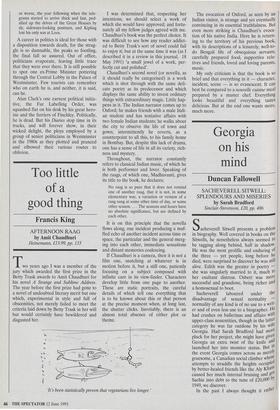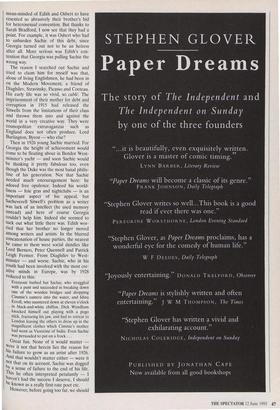Georgia on his mind
Duncan Fallowell
SACHEVERELL SITWELL: SPLENDOURS AND MISERIES by Sarah Bradford Sinclair-Stevenson, £20, pp. 486 Sacheverell Sitwell presents a problem in biography. Well covered in books on the Sitwells, he nonetheless always seemed to be tagging along behind, half in shadow. He was the most prolific and enduring of the three — yet people, long before he died, were surprised to discover he was still alive. Edith was the greater in poetry -- she was singularly married to it, much to her exultant distress. Osbert was more successful and grandiose, being richer and a homosexual to boot.
Sacheverell laboured under the disadvantage of sexual normality -- normality of any kind is of no use to a writ' er and of even less use to a biographer. He had crushes on ballerinas and affairs With upper-class nonentities, though in the latter category he was far outdone by his wife Georgia. Had Sarah Bradford had more pluck for her project, she might have given, Georgia an extra twist of the knife and launched her into monster status. But In the event Georgia comes across as merely gruesome, a Canadian social climber whose attempts to straddle the heights occupied by better-healed friends like the Aly Khans caused her much internal bruising and g°t Sachie into debt to the tune of £20,000 by 1949, we discover. In the past I always thought it rather mean-minded of Edith and Osbert to have resented so abrasively their brother's bid for heterosexual convention. But thanks to Sarah Bradford, I now see that they had a point. For example, it was Osbert who had to unburden Sachie of this debt, since Georgia turned out not to be an heiress after all. More serious was Edith's con- tention that Georgia was pulling Sachie the wrong way.
The reason I searched out Sachie and tried to claim him for myself was that, alone of living Englishmen, he had been in on the Modern Movement, a friend of Diaghilev, Stravinsky, Picasso and Cocteau.
His early life was so vivid, so cable. The
imprisonment of their mother for debt and corruption in 1915 had released the Sitwells from the limitations of their class and thrown them into and against the world in a very creative way. They were cosmopolitan extravaganzas such as England does not often produce. Lord Burlington, Byron — who else?
Then in 1926 young Sachie married. For Georgia the height of achievement would come to be floating about in Bendor West- minster's yacht — and soon Sachie would be thinking it pretty fabulous too, even though the Duke was the most banal philis- tine of his generation. Not that Sachie needed much encouragement here: he adored free opulence. Indeed his world- liness — foie gras and nightclubs — is an important aspect of his appeal, but Sacheverell Sitwell's problem as a writer was lack of an intellect (he used memory instead) and here of course Georgia couldn't help him. Indeed she seemed to suck out what little there was. Edith wor- ried that her brother no longer moved among writers and artists. In the blurred concatenation of house parties, the nearest he came to them were social dandies like Lord Berners, Peter Quennell and Patrick Leigh Fermor. From Diaghilev to West- minster — and worse. Sachie, who in his Youth had been involved with the most cre- ative minds in Europe, was by 1928 reduced to this:
Everyone bathed but Sachie, who struggled with a punt and succeeded in breaking down one of the wooden bridges and dropping
Cimmie's camera into the water, and Idina Erroll, who sauntered down at eleven o'clock in black-and-white chiffon. Dick Wyndham
knocked himself out playing with a pogo stick, fracturing his jaw, and had to retreat to London leaving the others to dress up in the magnificent clothes which Cimmie's mother had worn as Vicereine of India. Even Sachie was persuaded to put on a frock . . .
Great fun. None of it would matter were it not that herein lies the reason for his failure to grow as an artist after 1926. And that wouldn't matter either — were it not that on its account, Sachie was dogged by a sense of failure to the end of his life. This he often interpreted petulantly — I haven't had the success I deserve, I should be known as a really first-rate poet etc. However, before going too far, we should
remember that we are not dealing here with a negligible quantity. He was the most irrational of the Sitwells, which is saying something, and though prolixity tended to diffuse his poems into a too thin vapour, lack of intellectual control also gave rise to his extended prose rhapsodies on artistic subjects. They are sometimes flawed, but they are unique. Nothing remotely like them exists in any other literature. I love them for their free-associating proliferation of recondite data, their surreal and peri- staltic movements of exoticism, their outrageous and labyrinthine improbability. There was more fantasy, more caprice in him than in any of his contemporaries and his entire oeuvre is a kind of billow- ing psychedelia in which the macabre and the exquisite, the ludicrous and the lost, are in continuous and queasy transforma- tion.
To meet, he was a man of fully evolved characteristics, charming, spicy, mercurial and so alive. I do miss some of that in this biography. The parade of trivial ill-temper and callousness (often not his) is at times disheartening: bad parties, rows, infideli- ties, money problems, acrimonious proper- ty disputes. The way he bundled his sons about is not attractive and his own misery at school did not prevent him from putting them through an identical ordeal. The book is full of protestations of love and of breathtaking cruelties and almost everyone in it seems to live against a background of low, grumbling bitterness.
Bradford knows how to put a biography together but her statement that `Duncan Fallowell visited Sachie on four separate occasions over the 12 months before he died' is quite wrong and I hope not symptomatic of her source technique. I first visited him in 1982 and at regular intervals thereafter and told her so. Besides, she must know as well as anyone that for significantly more than a year before he died in 1988, he was gaga and in no state to entertain me with his reflections as wonderfully as he did.
And he was very wonderful, let it be made clear. No one was more thoroughly, more unselfconsciously, at home on Par- nassus. Of all the people I have met and written portraits of — including Graham Greene, Arthur Koestler, Garcia Marquez, Andy Warhol — only William Burroughs has been his equal in richness and originali- ty of character. Sachie did not date at all he loved the idea of the Notting Hill Carnival when I told him about it — but how sad that the spangled balloon which the Sitwells blew into our cultural life seems now so far away, and how dreary that the launch party for this book should have been held at, ugh, Brooks's Club. But Georgia would haSe been pleased.




































































 Previous page
Previous page